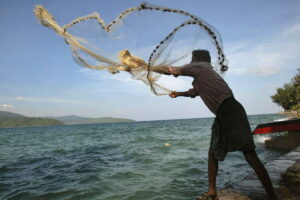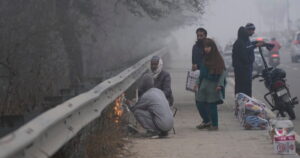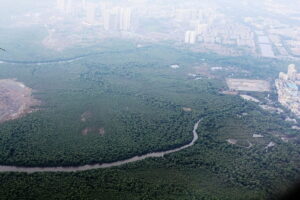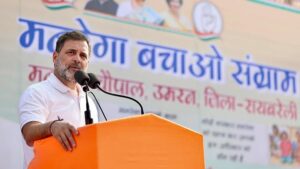The fisherwoman has spent her entire life harvesting the ocean’s bounty, but in recent years, the fish have become elusive.
“The fish that we used to catch reliably are harder to find now; the warming waters and changing currents mean the fish populations have shifted,” Rahman said.
“It’s becoming a real struggle to feed my family. I have to travel further from shore to find a good catch, which is very physically demanding for someone my age.”
For Siti, 78, a widowed farmer living in Maros, the uncertain outlook is similar.
“The weather has become so unpredictable these days,” he said. “The rainy season used to be reliable, but now the rains come at strange times and are much heavier. It makes it very difficult for me to grow the food I need to survive.”
Rahman and Siti are just two of the millions of older Indonesians living in the country’s eastern provinces who are witnessing the devastating impacts of climate change firsthand.
Older adults are overlooked in the urgent global conversations about climate change. As our climate continues to warm and weather patterns become increasingly erratic, older adults face distinct challenges that demand nuanced attention and intervention strategies.
Perhaps nowhere is this more true than in the Eastern Indonesia provinces, where livelihoods, health and wellbeing of older people are being put at grave risk.
Dramatic weather shifts
Researchers from Monash University are exploring the impacts of climate change experienced by vulnerable communities, including older adults, in the region and their resilience strategies to cope with the challenges.
Other elderly respondents have described dramatic shifts in seasonal patterns that have disrupted traditional farming and fishing practices.
Longer droughts, more intense rainfall, and unpredictable winds have made it increasingly difficult to time planting, harvesting, and fishing trips. As a result, food insecurity has risen dramatically, with older people often the hardest hit.
Climate change impacts are also compounded by the remote and under-resourced nature of much of Eastern Indonesia. Access to healthcare, social services and infrastructure to cope with extreme weather is limited, leaving older people especially vulnerable.
“When the floods come, it’s a real struggle for me to evacuate to higher ground,” says Siti. “I live alone and have trouble walking long distances. The local authorities don’t have the capacity to assist everyone who needs help.”
Older people on fixed incomes in Eastern Indonesia often lack the financial resources that can further limit their ability to take preventive actions to the climate change impacts.
Few options for elderly
Unlike younger residents who may be able to migrate to cities, older Indonesians often have few options.
With limited mobility and access to healthcare, they struggle to cope with disasters like floods and droughts. And as younger generations move away, the traditional knowledge and support systems that elders once relied on are disappearing.
Another impact felt acutely by older adults is the increased frequency and intensity of extreme heat events.
According to a 2023 report from the Intergovernmental Panel on Climate Change, heat waves are becoming hotter, longer, and more frequent around the world. This poses major dangers for the health of older people, whose bodies are less able to regulate temperature.
One study found that the risk of heat-related hospitalisation is nearly 10 times higher for adults over 85 compared to younger populations.
Heat can be a killer
The impacts of extreme heat go beyond just causing heat stroke and heat exhaustion. It can also exacerbate underlying chronic conditions common in older adults, such as heart and lung disease.
A meta-analysis revealed that for every 1 degree increase in temperature there is an associated 1.1 percent rise in cardiovascular death among people over 65.
Seniors are also more susceptible to worsening air pollution, the spread of infectious diseases and other climate-driven threats.
Beyond the direct health impacts, climate change also impacts older adults’ rights.
Older people in Indonesia face significant challenges in accessing fundamental rights and services, including adequate healthcare, food security, clean water and sanitation, suitable housing, freedom of mobility, sustainable livelihoods and social safety nets.
Strategies of resilience
Despite these challenges, the study found that many older adults are drawing on traditional ecological knowledge and community-based strategies to build resilience.
This includes planting more climate-resilient crop varieties, diversifying food sources, livelihood strategy, community-based strategy and making use of social safety nets.
Older people are also getting support from their family members and playing a key role in passing down adaptation practices to younger generations.
This study has shown that government programs and policies have so far done little to support these grassroots resilience efforts in Eastern Indonesia. The authors call for greater investment in community-based adaptation initiatives for older residents, with an inclusive strategy that takes account of the unique vulnerabilities of older people.
Maximising national policies and programmes through interventions across five key policy areas — social protection, public health, livelihoods, housing and community infrastructure — for securing and sustaining the resilience of Indonesia’s vulnerable elderly population is critical.
Inclusive strategies are more likely to create opportunities to strengthen resilience for older people on a large scale.
Older Indonesians are revealing themselves to be active agents of change, drawing on their life experiences to guide their communities through an uncertain future.
Their resilience and innovation offer valuable lessons for policymakers and development practitioners seeking to support effective climate mitigation and adaptation, especially in vulnerable, resource-poor regions.
As the impacts of climate change intensify, centering the voices and experiences of older people will be crucial. After all, they are the ones who have weathered the storms of the past, and have much to teach about navigating the trials to come.
(Published under Creative Commons from 360info. Read the original article here)






